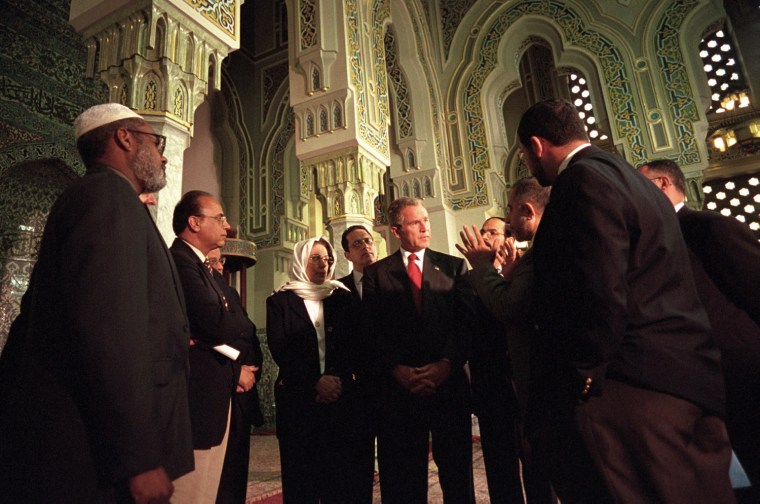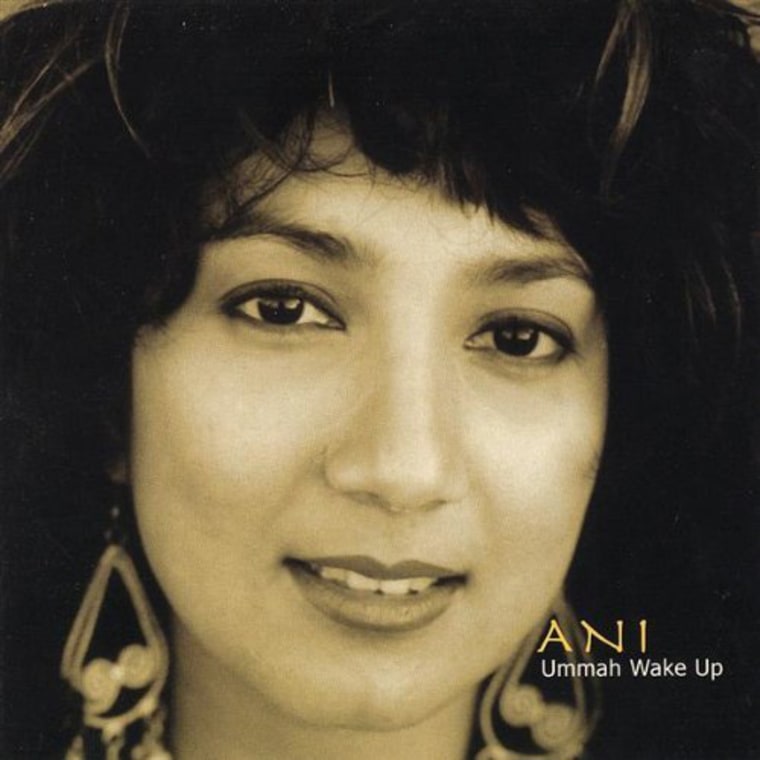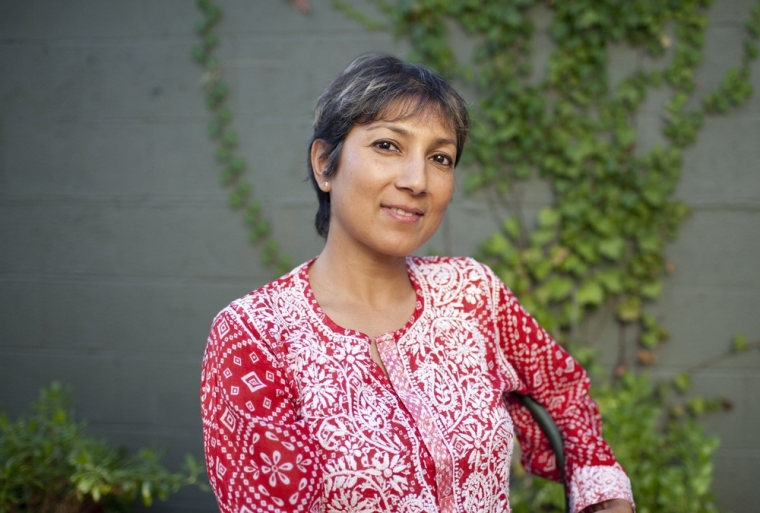Like other aspiring reformers before her, Ani Zonneveld takes positions that make her unpopular with her religion's spiritual leaders, in this case America's Islamic elders.
Not only does she lead prayers — a task normally reserved for men — but she is an outspoken advocate for gay, bisexual and transgender Muslims. Later this year, she plans to officiate at the Islamic wedding of a lesbian couple, which is perfectly acceptable by her reading of the Quran.
“The community we are building is very different from most of the mosques you would walk into,” said Zonneveld, a 49-year-old Malaysian-born singer-songwriter. “We are very inclusive of all Muslims, gay Muslims, mixed-faith couples. … We also don’t segregate (the genders) when we pray, and we allow women to lead prayer. Our values are very egalitarian and we really live those values out.”
Muslims for Progressive Values, which Zonneveld co-founded in 2007 with Pamela Taylor, a feminist American Muslim, is based on . They include a commitment to equality of genders and for LGBTQ (or lesbian, gay, bisexual, transgender and questioning) people, repudiation of militarism and violence and the need for “critical engagement with Islamic scripture.”
Some of the group’s aims dovetail with those of other emerging Muslim groups that challenge the orthodoxy they say is preached in the majority of U.S. mosques. But the nonprofit’s embrace of the LGBTQ population is unique, even among these reform-minded groups.
The American Muslim population, estimated at between 3 million and 6 million, is diverse, including immigrant populations from all over the world as well as U.S.-born faithful and converts. Nearly half said they attend mosque at least once a week, according to a 2011 Pew survey, while many worship privately or infrequently. According to the survey, 37 percent believe there is only one way to interpret the religion. Some wear traditional garb, like head coverings, and grow beards, but more do not.
Parsing the Quran
Even so, unlike the Protestant world, where debate over Biblical interpretation has led to varying positions on homosexuality, few mosques and Muslim organizations question the orthodoxy that homosexuality is banned.
This position on homosexuality typically cites the Quran’s references to “the people of Lut” — the residents of Sodom and Gomorrah, who were said to have been destroyed by Allah, presumably because of their 'perverted' sexual practices. In at least six majority Islamic countries, homosexuality is considered a capital crime.
The most influential Muslim religious organization in the United States has taken a position similar to that of the Vatican.
"Homosexuality is a moral disorder. It is a moral disease, a sin and corruption,” Muzammil Siddiqi, former president of the Islamic Society of North America, has written. “No person is born homosexual, just like no one is born a thief, a liar or murderer. People acquire these evil habits due to a lack of proper guidance and education.”
Siddiqi did not return calls requesting an interview.
That does not mean that homosexuals are shunned, said Shakeel Syed, executive director of the Islamic Shura Council of Southern California, an umbrella organization for mosques and Muslim organizations with approximately 500,000 members.
“Islam doesn’t cast out anyone," said Syed. "No one will condemn them. LGBTQ people can do whatever they feel is right in their own way and we respect that. But if one seeks sanction from the faith, they will be disappointed.”
When the California Supreme Court ruled in favor of same-sex marriage in 2008, the council issued a release expressing “deep dismay” at the decision. “We believe that the (ruling) is a violation of God’s law as clearly given in the Quran and the Bible,” it said.
But such statements do not mean the mosques are full of homophobes, said Arsalan Iftikhar, a human rights lawyer and author of the book “Islamic Pacifism, Global Muslims in the Post-Osama Era.”
“Generally speaking, although most Muslims would concede that homosexuality is not allowed within mainstream Islamic teachings, I also believe that most Americans of all religions would also say that LGBTQ Americans should not be discriminated against in any manner because of broader civil rights implications,” Iftikhar said via email.
Same chapter, different interpretationThere are Islamic scholars who say that the passages in the Quran about the people of Lut can be interpreted in different ways. Among them is the nation's only gay imam, Daayiee Abdullah, who has studied the Quran in Arabic and in Chinese and English translations.
"Traditional interpretation is that the Lut story talks about homosexuality — that (comes) from people who are reading it from a heterosexual normative," said Abdullah, who has worked for more than a decade to help other gay Muslims deal with the apparent conflict between their sexual preference and their religion.
Abdullah's interpretation of Lut is that Allah destroyed the people not because they were engaging in consensual homosexual sex, but engaging in something closer to gang rape, just one facet of what he says was a particularly cruel society.
He also said that attitudes among the general population of American Muslims toward gays have softened in the last decade, but most still do not fully accept the lifestyle.
"It used to be that people thought being gay and Muslim was an oxymoron," he said. "Now, they will concede that there are people who are gay and Muslim, but (that) they should not do the sex thing. They should get married. But that puts innocent women into a position where they are in a loveless relationship. It forces people not to have a sexual part of their life. And God gave sex to people for enjoyment."
'How can you just let it slide'
Zonneveld said her activism grew out of frustration with other American Muslims for being either too willing to accept the word of conservative imams or unwilling to speak out.
“If there is a homophobic sermon at Friday prayer … nobody would stand up and say, ‘I’m sorry that’s an appalling sermon,’” said Zonneveld. “But I can’t sit with a community where it is acceptable to be homophobic …. How can you just let it slide?”
Muslims for Progressive Values is intended to provide a space to worship and a voice to Muslims who don’t necessarily agree with American Muslim leaders often seen as speaking for the entire flock.
Zonneveld, a lifelong Muslim, spent part of her childhood in Germany and Egypt, then attended college in Illinois. She became a professional singer and songwriter and now works with well-known artists, including include blues singer Keb’Mo and Melissa Manchester. Her husband is from Holland and their 13-year-old daughter goes to a public school.
For many years, Zonneveld kept her religion under wraps, partly out of concern that it could harm her career in the entertainment industry.
But events surrounding the Sept. 11 attacks sparked her to “come out” as a Muslim.
In the days after the attacks by Muslim extremists, President George W. Bush appeared with Muslim religious and community leaders. She thought it was a commendable gesture — an effort to signal that the United States should not condemn all Muslims for the actions of a few extremists. But she was appalled to think that the Muslims called upon to represent her and her fellow Muslims did not seem mainstream.

“The vast majority of American Muslims believe in an Islam that is so different from the people (who have been) representing us,” said Zonneveld. “It would be like if you had an ultra-Orthodox Jewish rabbi representing all American Jews; they would be up in arms. … It would be complete misrepresentation of the American Jewish community.”
‘Jihad is long overdue’
For the first time in her career, Zonneveld incorporated her faith into her profession, producing an album called “Ummah Wake Up!” and again collided with conservative strictures embraced by some Muslims.
In the title song, she calls on the “Ummah” — roughly “community” in Arabic — to take up a jihad, which to her means an “internal struggle to be more godly, more merciful, more forgiving, more like God is.”
she sang accompanied by a rock beat and Middle Eastern-flavor instrumentation created on a synthesizer.
But she said that a number of Muslim retailers and organizations told her that what she had done was forbidden, saying only percussion may accompany the voice, and then only a man’s voice.
“I was in shock that this would happen in America,” said Zonneveld.
She eventually found a group of like-minded Muslims and helped launch a challenge to the “mainstream” Muslim orthodoxy in 2004 under the Progressive Muslim Union umbrella. The effort flamed out in 2006 because of infighting over whether Republicans could be included and whether members should even have contact with more conservative Muslim groups.
Distributing an alternative message
Zonneveld and Taylor started their own group in 2007, this time focused around 10 guiding principles that they use to define their brand of progressivism, including the equality of genders and sexual orientations.
Members also were called on to engage in critical discourse over Islamic scriptures and issues of people in the faith.

That includes, in Zonneveld’s view, admitting that some interpretations of Islamic writings inspire some people to violence — typically disaffected young men who are surfing the Internet.
“There is radicalization — to deny it is silly,” Zonneveld said.
On Monday, Muslims for Progressive Values, which she says now has chapters in five cities and several thousand followers, is holding a fundraiser in Washington, D.C., for a project called “Literary Zikr” to publicize its interpretation of Islam. The group also is using the Internet to counterbalance strict interpretations of Islam and efforts by others to demonize the religion.
“Suppose a guy Googles, ‘What is Judaism?’” said Zonneveld, noting that the search would return many websites that vilify Jews or advocate violence against them. “Our site would say that … they are among the (broader definition of) believers."
“This is exactly the type of work that needs to be done,” to combat radicalization in the community, said Zudhi Jasser, who founded Phoenix-based American Islamic Forum for Democracy.
His group also opposes what he says is the "Islamist" approach taken by many Muslim leaders who presume to speak for mainstream Muslims.
Jasser urges Muslim leaders in the United States to remove politics from the mosques and allow greater discourse on the meaning and interpretation of the Quran. He and Zonneveld agree on that, though they diverge on many other points.
Jasser has been savaged by many Muslims for speaking out about radicalization and, in particular, for testifying at Congressional hearings in March on “the threat of radicalization in the American Muslim Community." He agreed with the assertion that imams and many Muslim organizations dismiss or deny potential radicalization, and by doing so could even encourage it. Many Muslims have characterized him as a shill for the right wing, because the hearings, held by Rep. Peter King, R-N.Y., were seen as a platform for politicians capitalizing on anti-Islam sentiment.
Zonneveld also faces disapproval from Muslims — not only by those who hold to traditional views — but also those who argue that singling out Muslim radicalization from other types of extremist violence fuels bigotry.
Her stance also has drawn attention from those with a very different agenda, she said.
She said that after she aired her concerns about radicalism in an event at UCLA in early October, she was approached by a woman from a right-wing political organization who appeared to be recruiting her.
“Just because I’m critical of the Muslim community does not mean I’m interested in being anti-Islam,” she said. “We are critical. We call a rat a rat. … I think you can be honest without kowtowing and using the language of Islamophobes.”
